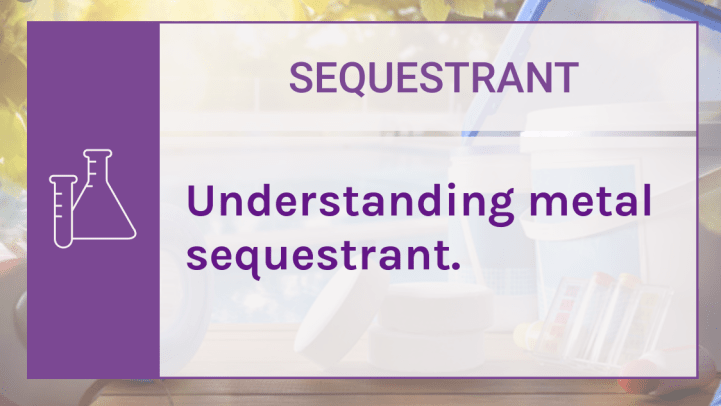What is Sequestrant?
Sequestrants are chemicals that bind to mineral and metal ions in water and prevent them from precipitating (or falling) out of solution and clouding or staining surfaces.
You can check how sequestering agents and chelating agents work, but bottomline is they are very similar and have the same end result. The most common use in the pool and spa industry is for the removal of metals and minerals such as copper, iron, manganese, and the mineral calcium that can cause the ever-annoying white line along the waterline.
These can be introduced by fill water (especially if using water from a well) and you would typically use a sequestrant to prevent staining if one of these metals or minerals was above normally acceptable levels.
Sequestering agents should be used in preparation for removing stains, where it would be added prior to treating stains. The sequestering agent helps by binding the released ions that are lifted from stain removal and preventing them from redepositing.
It is important to understand that the use of sequestering agents doesn’t remove or filter out metals or minerals from water, it keeps them in suspension and prevents them from depositing (or redepositing). In order to keep the ions in solution, maintenance doses are needed according to individual product directions.
There are some exceptions depending on the brand of sequestering agent and the type of filter used so it’s best to check your specific product’s application.
What Form Does a Sequestering Agent Come In And How Do I Use It?
Sequestering agents are typically sold as a liquid in 1 quart or larger bottles, however, there are granular options as well.
The agent should be poured around the perimeter of the pool or can be poured into the skimmer as well. As with all pool (or spa) chemicals, it’s important to follow the manufacturer’s directions for their specific product.
Safety Information About Sequestering Agents
You should always read and follow all safety precautions on the product labels. Keeping your pool (or spa) safe means keeping yourself and others around you safe while maintaining your chemistry and your equipment. Some common recommendations include:
- Wearing protective gear such as gloves and eye protection.
- Store chemicals in ventilated areas and separate from one another to avoid chemical reactions from leaks.
- Do not mix chemicals.
See this informative video for some more great tips on pool chemicals safety.

